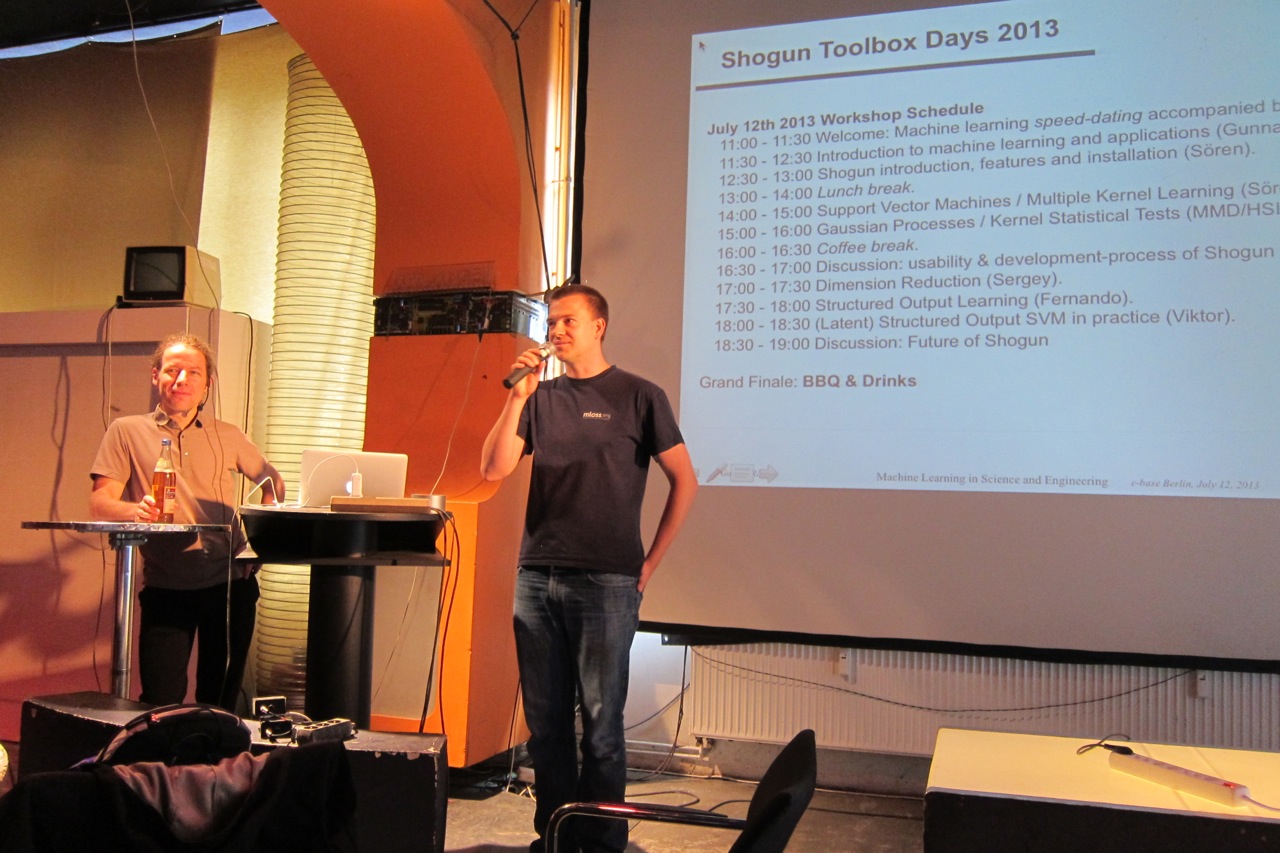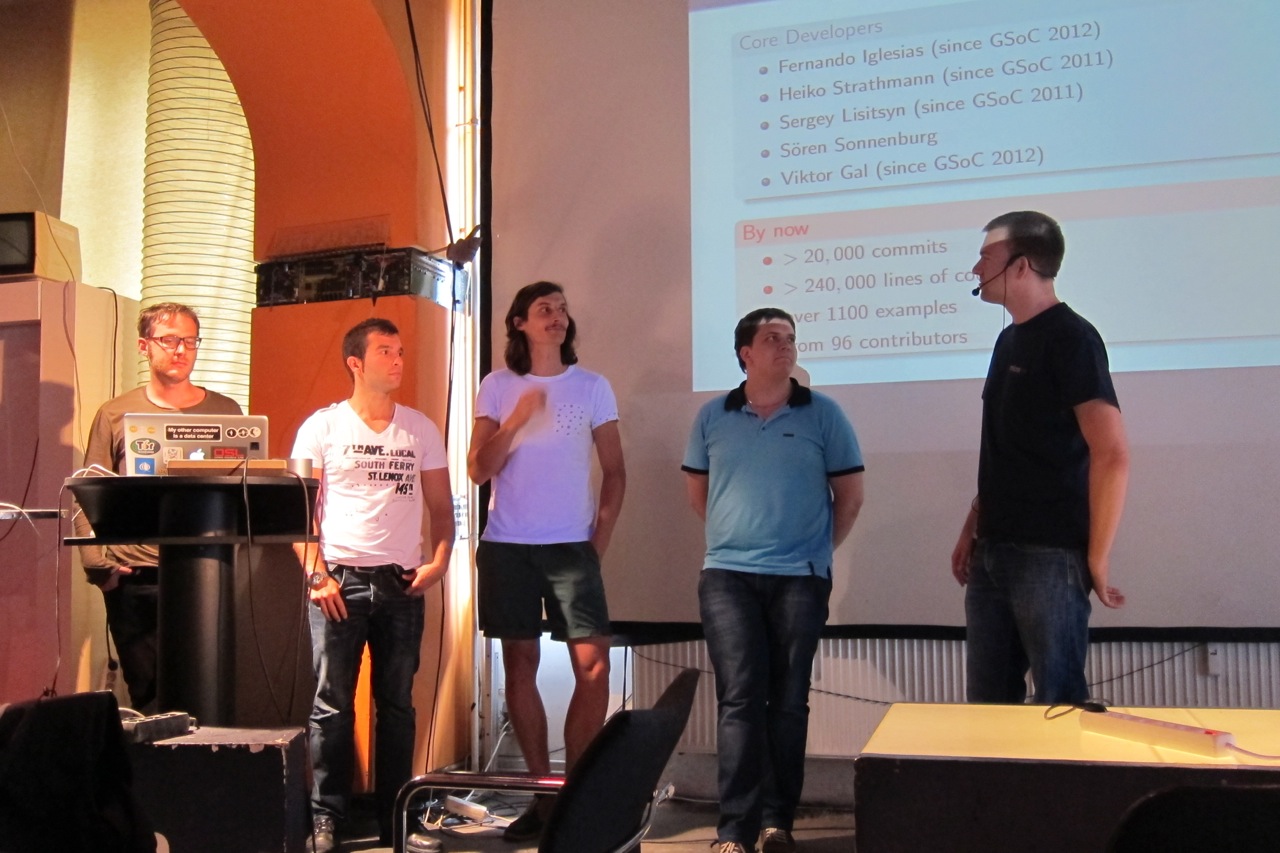This weekend, I visited the beautiful city Reykjavik in Iceland for the first time. I participated in this year’s workshop on Latent Gaussian models (link) (in fact mostly spatial statistics) and also presented a poster (link), which is about our recent work on Russian Roulette for intractable likelihoods (arXiv, blog). Met a lot of nice people doing interesting things there.
talks
Shogun Workshop 2013
Last weekend, our Shogun workshop finally took place in Berlin. It was really cool to meet all those guys in person. We have been working together for quite some time now. The core-team an Shogun’s supporters are absolutely awesome. It is great to be part of that.
We had a nice afternoon at c-base (who were so friendly to host us) with some talks by all of our developers, followed by two days of hands-on workshop at the TU-Berlin.
I gave a little talk on two random things you can do with kernels (that are completely unrelated): Gaussian Processes and the kernel MMD. Slides are (download). I also wrote some IPython notebooks for GP-regression (link), GP-probit-classification (link), and two-sample testing with the kernel MMD (link).
One of the results of our discussions was that we will start using those notebook for Shogun’s documentation as they allow to combined code, plots, and maths in a web-based viewer.
Finally, here are some picture of us, (pretty nerdy)


Talk at the EBI in Cambridge
I gave a talk at the EMBL-European Bioninformatic institute in Cambridge, where I visited the group of Oliver Stegle.
The topic was “Adaptive Large-Scale Kernel Two-Sample Testing”. Slides can be found here behind this link.
NIPS paper: Optimal kernel choice for large-scale two-sample tests
NIPS 2012 is already over. Unfortunately, I could not go due to the lack of travel funding. However, as mentioned a few weeks ago, I participated in one paper which is closely related to my Master’s project with Arthur Gretton and Massi Pontil. Optimal kernel choice for large-scale two-sample tests. We recently set up a page for the paper where you can download my Matlab implementation of the paper’s methods. Feel free to play around with that. I am currently finishing implementing most methods into the SHOGUN toolbox. We also have a poster which was presented at NIPS. See below for all links.
Update: I have completed the kernel selection framework for SHOGUN, it will be included in the next release. See the base class interface here. See an example to use it: single kernel (link) and combined kernels (link). All methods that are mentioned in the paper are included. I also updated the shogun tutorial (link).
At its core, the paper describes a method for selecting the best kernel for two-sample testing with the linear time MMD. Given a kernel $k$ and terms
$$h_k((x_{i},y_{i}),((x_{j},y_{j}))=k(x_{i},x_{i})+k(y_{i},y_{i})-k(x_{i},y_{j})-k(x_{j},y_{i}),$$
the linear time MMD is their empirical mean,
$$\hat\eta_k=\frac{1}{m}\sum_{i=1}^{m}h((x_{2i-1},y_{2i-1}),(x_{2i},y_{2i})),$$
which is a linear time estimate for the squared distance of the mean embeddings of the distributions where the $x_i, y_i$ come from. The quantity allows to perform a two-sample test, i.e. to tell whether the underlying distributions are different.
Given a finite family of kernels $\mathcal{K}$, we select the optimal kernel via maximising the ratio of the MMD statistic by a linear time estimate of the standard deviation of the terms
$$k_*=\arg \sup_{k\in\mathcal{K}}\frac{ \hat\eta_k}{\hat \sigma_k},$$
where $\hat\sigma_k^2$ is a linear time estimate of the variance $\sigma_k^2=\mathbb{E}[h_k^2] – (\mathbb{E}[h_k])^2$ which can also be computed in linear time and constant space. We give a linear time and constant space empirical estimate of this ratio. We establish consistency of this empirical estimate as
$$ \left\vert \sup_{k\in\mathcal{K}}\hat\eta_k \hat\sigma_k^{-1} -\sup_{k\in\mathcal{K}}\eta_k\sigma_k^{-1}\right\vert=O_P(m^{-\frac{1}{3}}).$$
In addition, we describe a MKL style generalisation to selecting weights of convex combinations of a finite number of baseline kernels,
$$\mathcal{K}:={k : k=\sum_{u=1}^d\beta_uk_u,\sum_{u=1}^d\beta_u\leq D,\beta_u\geq 0, \forall u\in{1,…,d}},$$
via solving the quadratic program
$$\min_\beta { \beta^T\hat{Q}\beta : \beta^T \hat{\eta}=1, \beta\succeq 0},$$
where $\hat{Q}$ is the positive definite empirical covariance matrix of the $h$ terms of all pairs of kernels.
We then describe three experiments to illustrate
- That our criterion outperforms existing methods on synthetic and real-life datasets which correspond to hard two-sample problems
- Why multiple kernels can be an advantage in two-sample testing
See also the description of my Master’s project (link) for details on the experiments.
Download paper
Download poster
Download Matlab code (under the GPLv3)
Supplementary page